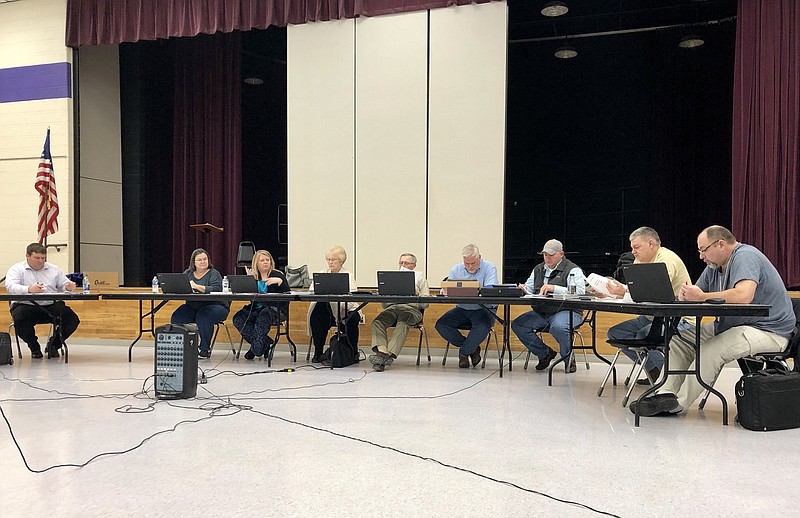Several Grundy County, Tenn., school board policies were set to be updated during the February school board meeting, but those updates were put off to the upcoming March 15 meeting after February's meeting ran late.
The policy updates were recommended by the Tennessee School Boards Association, which provides notifications of statutory and regulatory changes to local school districts that subscribe to its service. As of the beginning of the year, 123 districts subscribed to the service.
Other policy updates
› Graduation requirements: Adding a new diploma that is available to special education students› Promotion and retention: Changes place a greater emphasis on promotion and provides more detailed factors to identify when considering retention› Graduation activities: Expands the variety of student awards and achievements that must be noted at graduation› Testing programs: Updates methodology information for TNReady and end-of-course exams› Attendance: Adds a “progressive truancy intervention plan,” which includes three tiers› Medicines: Includes new guidelines for administering adrenal insufficiency medicationNew policies› Opioid antagonist: State districts must keep at least two opioid antagonists in each school in case a student experiences a drug overdose and details parental notification and maintenance procedures.› Glucagon and diazepam gel: Spells out who is permitted to administer glucagon, a hormone used to treat students with low blood sugar and are unable to take liquid or food by mouth because of unconsciousness or seizures
Those updates are then added to the school board agenda to be voted on for approval, Director of Schools Jessie Kinsey said in an email.
"[This] is vital to a smaller school district like Grundy County who do not have a full-time attorney on staff," she said.
Kinsey was not able to immediately provide the exact fee for the service, and TSBA representatives did not return a request for clarification before press time.
In its latest notification to Grundy County Schools, the TSBA detailed 10 recommendations for policy updates and two new policies.
Among those recommendations are updates to the "homebound" education policy. Five boys who have been charged with the attempted aggravated rape of their freshman teammate were ordered by a juvenile court judge to be placed on house arrest and to enroll in the homebound education program before that judge recused himself from the case. It's not clear what the boys' current enrollment status is, as a second judge placed a gag order on information connected to their cases.
But the homebound instruction program is usually "for students who, because of health impairments, are unable to attend the regular instructional program," according to the special programs policy.
Now, to qualify for the homebound program, a student must have a health impairment that is serious enough to anticipate an absence of 10 consecutive days. The TSBA's recommended update was to reduce the 10-day absence to just five days in order to be in line with truancy requirements, which state that students who are absent five days without being excused will be reported to the director of schools.
The TSBA noted that the board could choose to maintain the 10-day requirement.
Another recommendation was to change the policy on alternative school programs. A full overhaul of the example policy provided to local districts was made after the state board removed outdated language and clarified minimum requirements in its policy.
Students who have been suspended or expelled from regular school are required to attend an alternative school program, and the current policy does not specify if the district is required to report information to the state about its programs. Under the recommended policy, the district would have to report how many alternative school programs are in operation, the number of students enrolled, their grade levels, reason for enrollment and how many faculty and staff are employed.
The recommended policy also spells out what needs to happen when a student is assigned to the program, such as notifying parents, and the need to develop a procedure to help integrate students as they enter and exit the program. The current policy is not as detailed.
Another recommendation is to make changes to the qualifications and duties of the director of schools. The current director of schools, Jessie Kinsey, has not been evaluated in the two years she's been in office.
The update has to do with adding a provision to make the director's responsibility more clear. The new provision states that the director must file reports with the Office of Educator Licensing about educators' discipline. This includes which educators have been suspended or dismissed or who have resigned after allegations of misconduct, which if substantiated would warrant consideration for license suspension or revocation. The report shall be submitted within 30 days of suspension, dismissal or resignation.
"This is not a new legal requirement, but we recommend making the director's obligation clearer," the TSBA notification read.
All of these proposed policy updates are expected to be voted on at Thursday's school board meeting.
Contact staff writer Rosana Hughes at rhughes@timesfreepress.com or 423-757-6327 with tips or story ideas. Follow her on Twitter @HughesRosana.
